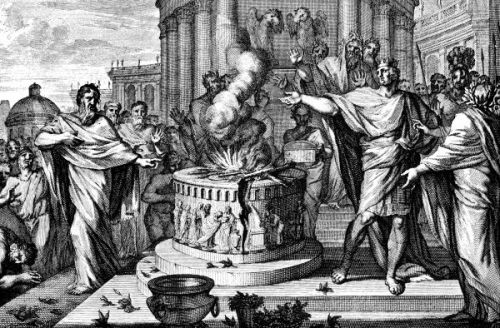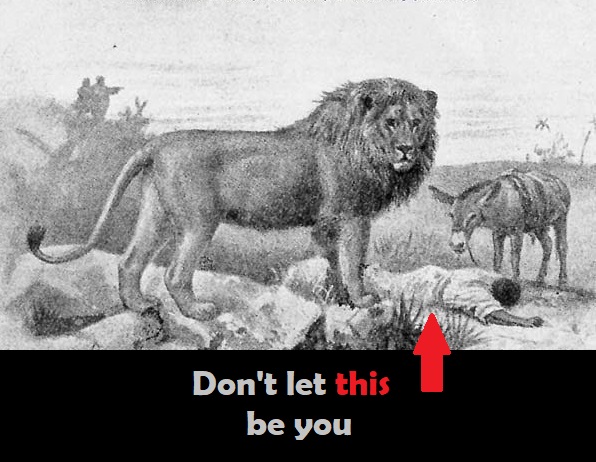Alternate Truth?
By Anthony Casperson
7-18-20
About a month ago, I read 1 Kings 13 for my morning bible reading. As I sat there thinking about the story recorded in the book, I knew that the truth contained within the narrative was worthy of being talked about here in the blog.
We followers of Jesus need to be reminded of the treasured wisdom here. It is true of all times and places where those who worship the God of the bible find ourselves. However, for specific reasons common today in western culture, I felt the need to remind us of the truth.
I wondered how to introduce the concept. Normally, I try to connect the biblical ideas I want to talk about with some nerdom. After all, using the nerdiness of my personality is a large part of the conceit for the website. On occasion, I turn to another part of my drive for the various blogs and sermons. My own struggle with depression and anxiety leads me to talk about thriving in the midst of the darkness.
These two directions for the biblical application are the reason why the tagline for the website is: “The beauty of God, in the mess of the world, through the eyes of a nerd.”
Thinking about how to introduce the concept found in 1 Kings 13 with these two directions left me with nothing but incomplete or trite illustrations. That’s part of the reason why it took me about a month to get around to writing this blog.
A part of me figured that I should just drop the idea and write something else. But I realized that taking that train of thought would lead me to doing something akin to what the passage speaks against. To not write about this biblical truth would leave me just as culpable as the characters in the story.
I even thought about coming straight out and talking about the issues of the day that made me want to talk about the passage. That would be easy enough. I know why I think we followers of Jesus in the western world at this time need to hear it. However, without a personal touch to those reading this, the words could be taken out of context. Or at worst, the words could seem confrontational, adversarial, or hateful.
My desire is to speak to my fellow followers of Jesus, my brothers and sisters in the faith, those whom Jesus loves and died for. And if any who do not count themselves among this group should look in, I hope they see the tear-filled reminder for what it is: a call to godliness that all of we followers of Jesus forget from time to time. You and me together in this failing.
I don’t want us spending the whole time looking at the passage thinking about what the precise thing I’m thinking about is. Nor do I want us to spend the time thinking about all of “those people” who need to hear these words. This isn’t an exercise in finger pointing. I’m not looking to blame. My desire is that we all take a moment to contemplate this truth for our own individual spiritual lives.
Perhaps then, we can join to the truth of God and bring his joy to those around us.
But enough of my overly-long, non-introductory introduction. Let’s look at the passage. It begins with a prophet during the time after the nation of Israel split between the northern kingdom of Israel and the southern kingdom of Judah. The godly prophet from Judah traveled north to speak to the king of Israel, named Jeroboam.
This first king of the northern kingdom had built two altars to the God of Abraham, Isaac, and Jacob that had not been commanded by God to be built. The reason the king placed them was so that the northern kingdom wouldn’t return to being under the thumb of the southern kingdom’s rule because of the pretense of their shared religious customs. He desired to help his people worship the God of Israel while maintaining the new societal norm of having two nations, but did so in a manner that went against God’s commands.
God sends this prophet to stand before the king and tell him how important it is to keep God’s commands even when the situations in life make it difficult to do so. Even in the midst of societal change, the unerring word of God remains the same. And it must be followed.
God, speaking through the prophet, tells Jeroboam that the altar would break open and pour forth the ashes currently in it. And this would not be the end of the destruction of the altar. A future king of Judah would tear down this false altar and end the priests that served there at that time. (The prophet even gives the exact name of the king who was still many generations from being born, but that speaks more to the veracity of God’s prophetic word than the point I’m trying to make here. So, I’ll leave it as an aside.)
Jeroboam obviously had a problem with his newly minted place of worship being called heretical. He reached out to have the prophet seized, but the hand became deformed. The altar also broke open, pouring out the ashes in it. (Again, truthfulness of the prophecy on display.)
Witnessing the power of God against him, the king asked for the prophet to pray for his hand to be returned to him. The prophet did as the king asked and health returned to the hand. Though, clearly this demonstration of God’s displeasure didn’t dissuade the king from continuing the errant acts of worship.
The king also told the prophet that he’d compensate him with a great reward as well as a nice meal. But the prophet tells him something that is very important to the whole story. God had told the prophet to not eat or drink anything in the northern kingdom of Israel. He was also commanded by God to return home a different way than the one he took to get to the altar.
God had been explicit in his commands. And even a reward of half the kingdom wouldn’t be enough to make him disobey the word of God. It sounds like a good thing for the prophet to do. He’d been sent to prophesy against the king who’d gone against the explicit commands of God. How could he then go and do likewise? He must act in line with the truth of God’s commands to him.
Thus, the prophet leaves the king. But on his way, an old prophet of God hears of this younger prophet’s deeds in the land. The elder prophet desires to have fellowship with the one traveling back to his home. He goes to ask the prophet from Judah to have a meal with him in his home in the northern kingdom.
To no one’s surprise, the younger prophet refuses the invitation, explaining the explicit command of God again. But the older man uses his reputation as a prophet of God and lies to the younger man. He says that an angel had come to him from God, telling him to offer hospitality to this young prophet.
He offers a word from God that goes against the explicit commands given to the younger prophet. And I’m sure the situation in which the younger prophet found himself made him want to have this moment of respite. Perhaps his stomach grumbled at that very point. It wasn’t a small thing to travel from Judah to Israel and back again without any food or water. We’re not talking about a quick hike here.
He’d gone to tell the king of Israel that a change in societal circumstances doesn’t change God’s enduring commands, but now the young prophet stands with a very practical desire and words that seem to give him respite, even though they go against the explicit commands God gave him.
And he gives in.
The younger prophet, whom God had used to speak forth an important prophecy that would be remembered generations later when the words would be fulfilled, gave in to a lie because he wanted them to be true, regardless of their contradiction to the commands God had given him.
During the meal, the older prophet spoke a true prophetic word. He proved his own treachery as God placed truth into his mouth. The younger prophet had disobeyed the explicit command of God. And for this act of disobedience he would never return home. His body wouldn’t be returned to the family tomb.
The younger prophet began his journey home on a donkey, only to be met by a lion. The predator killed the younger man, but didn’t eat him. As a matter of fact, when the older prophet, the liar, searched out for the body to bury the young man in his own tomb in Israel, he found the lion and the donkey standing beside the dead prophet.
This no doubt was the work of God. A predator wouldn’t naturally kill something without consuming it. And leaving the donkey alive meant that it was directed at the dead man. There was no doubt. This was the end result of the prophet who had disobeyed the direct command of God just because an alternate statement to the truth sounded better.
Our circumstances, both societal and personal, don’t change the truth of God. His word, his will, his commands don’t change just because its easier to do this other thing in the time and place we find ourselves.
Yes, there are parts of the word of God that have cultural aspects. And there are times when we have to search out the universal application of his truth. Find the parts that need to be taken in line with our culture. But when explicit commands of God are given, to go against them is to do the very thing that Jeroboam and the younger prophet did.
We sin. And worse, we disguise our sin as worship.
If you’ve made it this far in reading this blog, I ask that you (as I seek to do myself) look into the places where we’ve used an alternate understanding of God’s word. Let’s check to make sure that we haven’t excused our sin as merely a difference of culture.
We should never agree to anything, even if it sounds like godly wisdom, that runs counter to God’s explicit commands.




